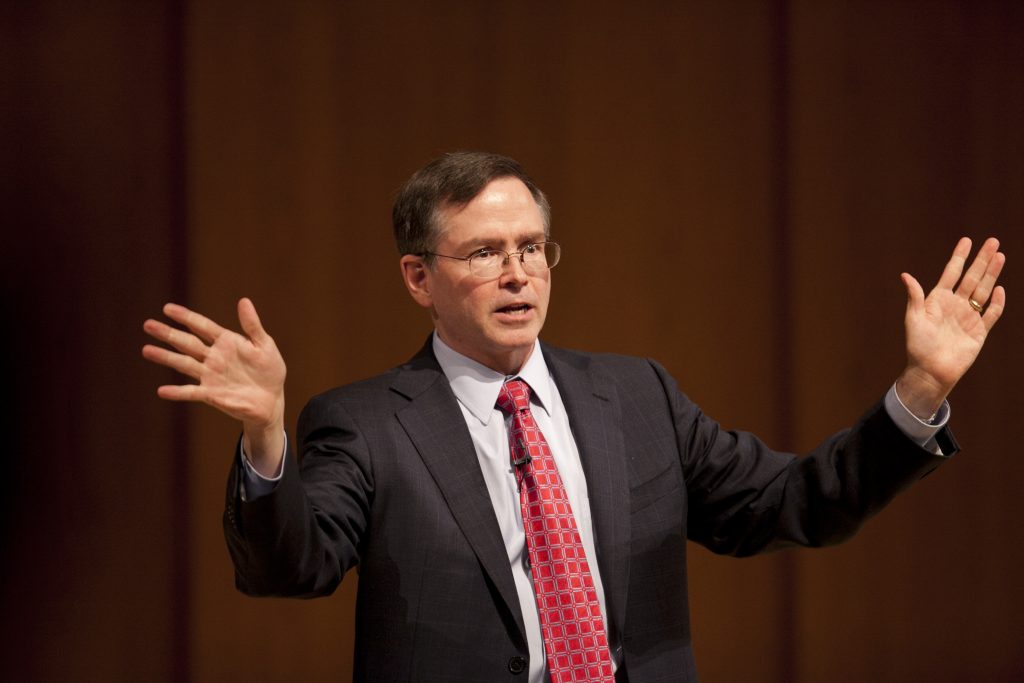This post was written in December 2011 by second year MBA student and CASE Fellow Joanne Sprague. Joanne reflects on a recent visit from Jim Fruchterman, Founder of Benetech and the recipient of the 2011 CASE Award for Enterprising Social Innovation.
When you talk to Jim Fruchterman, the rocket scientist who founded Benetech, about his advice for social entrepreneurs, be prepared to drink from a fire hose. His 29 years of experience championing a new industry have made him an extraordinary social entrepreneur and full of nuggets of wisdom that he’s learned over the years. A few that he shared with us when he was at Fuqua recently included:
- We can harness the power of technology to ensure that the innovations we create can benefit ALL society, not just the top 10%.
- You don’t need to have a tech degree to succeed in high tech – it’s more about the problems you can find and solve.
- The gap between what’s possible and what’s profitable is so big that the number of opportunities [to develop non-profit solutions to big issues] is huge.
Fruchterman knows what he’s talking about. After founding two of the foremost optical character recognition companies in the world, he launched Benetech, a “deliberately non-profit” technology company dedicated to solving unmet social needs. Since then Benetech has grown steadily to become a premier and highly sustainable organization with nearly $10M in annual revenues, ~85% of which Fruchterman says comes from customers (end users or third party payers), not philanthropy.
Benetech focuses on three main categories of social change – Literacy, Human Rights and the Environment – partnering with local grassroots organizations to create technology-driven solutions to day-to-day needs on the ground. We’ve profiled a few of their capstone solutions below:
- Bookshare is “Amazon meets Napster meets talking e-books for the blind.” After discovering that scanning books to make them accessible for people with disabilities was legal under US copyright law, Benetech built a digital library that provides access to books converted into Braille, large print or synthetic speech. Bookshare currently serves 150,000 students and will likely reach 200,000 by the end of year 5. Interestingly, Bookshare is also now embraced by the publishing industry (with 75% of books added voluntarily – and with rights for distribution outside of the US – from the publishing industry).
- Martus, the Greek word for “witness,” uses software to close the gap between availability of human rights abuse stories at the grassroots level, and availability of aggregation resources at the top. Benetech developed this open-source platform to collect and safeguard data on human rights violations, allowing organizations to bring greater attention to incidents and provide evidence for legal action.
- Miradi is a Swahili word for “project” or “goal.” Aside from reinforcing Benetech’s ability to name software programs after cool words from other languages, Miradi allows conservationists to more effectively plan, implement and measure their projects using a series of step-by-step interview wizards based on the Open Standards for the Practice of Conservation.
What’s next for Benetech? Each year the organization runs an idea-gathering process to generate new concepts from inside and outside of the company, from which they pick the top ideas to pursue. Fruchterman gave us a sneak peak of two new projects that came out of the pipeline last year:
- SocialCoding4Good, recently announced in Benetech’s “President’s Update,” will provide an online space for tech professionals to connect with nonprofits to volunteer their ideas, connections, time and skills on software development projects.
- Another project, CityOptions, will work with local governments that are committed to clean energy and climate change solutions to develop software and data collection tools that fit their needs, help to identify the best strategies for meeting their environmental goals, and allow for web-based, open source sharing of knowledge about climate solutions.

In recognition of this esteemed track record, CASE was honored to award Jim Fruchterman and Benetech with the annual CASE Award for Enterprising Social Innovation (ESI). We congratulate Benetech on their work to date and the impact yet to come!
Stay tuned at www.benetech.org or subscribe to the Beneblog for the latest updates on Fruchterman and his exciting, ever-changing organization.
About the Award:
CASE launched the Award for Enterprising Social Innovation (ESI) to recognize outstanding individuals, organizations, or companies whose innovations blend methods from the worlds of business and philanthropy to create sustainable social value that has the potential for large-scale impact. CASE awarded the inaugural recipient of the CASE Award for Enterprising Social Innovation (ESI) in the spring of 2009 and accepts nominations from the public annual each spring. Past recipients have included E&Co (2009); VisionSpring (2010); and Benetech (2011).
Watch the full video here:

